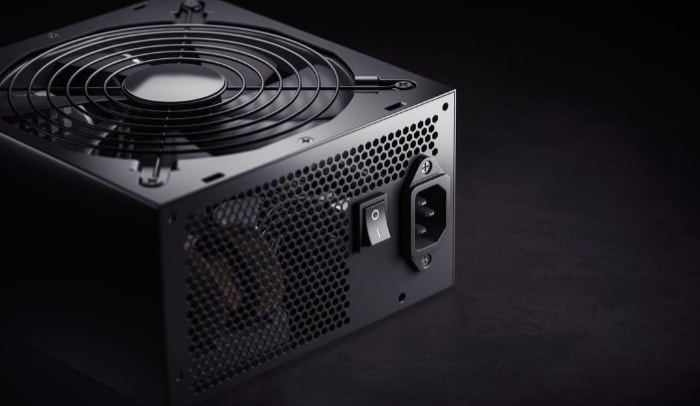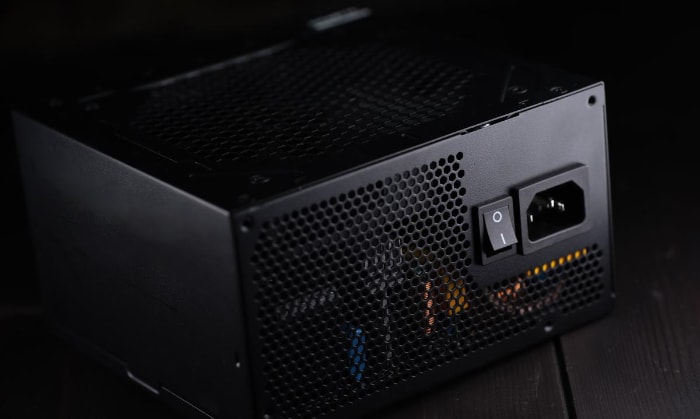Understanding PSU Ratings: Gold vs. Bronze

In the intricate world of computer hardware, the Power Supply Unit (PSU) plays an essential yet often overlooked role. It serves as the beating heart of a computer system, converting electrical energy from the source to the precise voltage required by various components.
Although the CPU, GPU, and memory often steal the spotlight, the quality and efficiency of your PSU can significantly influence your system's overall performance, lifespan, and energy efficiency.
Power Supply Units are rated by their efficiency – their ability to convert the power they draw from the outlet into usable power for your computer. Inefficient PSUs waste more power as heat, leading to higher energy bills and potentially more noise from cooling systems.
To help consumers understand the efficiency of different PSUs, the 80 Plus certification system was introduced.
In this 80 Plus system, PSUs are classified as White, Bronze, Silver, Gold, Platinum, and Titanium, in ascending order of efficiency. Each of these ratings is indicative of the power supply's operational efficiency and, in many ways, its quality. This blog will focus on two of these certifications: Bronze and Gold.
Bronze-Rated PSUs
Bronze-rated PSUs represent an important step up from the base 80 Plus certification, offering improved efficiency, lower energy costs, and potentially a more stable power supply.
Understanding Bronze-Rated PSUs
Bronze-rated PSUs guarantee a minimum of 82% efficiency at 20% load, 85% efficiency at 50% load, and 82% efficiency at 100% load.
This means that when your computer is running at these load levels, at least 82-85% of the AC power drawn from the wall is successfully converted into usable DC power. The rest is lost as heat, which is managed by the PSU's built-in cooling mechanisms.
The Pros and Cons of Bronze-Rated PSUs
Pros:
- Improved Efficiency: Bronze-rated PSUs are more energy-efficient than standard 80 Plus PSUs, leading to lower energy costs over time.
- Affordability: These PSUs often have a lower upfront cost than higher-rated models, making them a good choice for budget-conscious consumers.
Cons:
- Higher Energy Loss: While Bronze-rated PSUs are more efficient than standard models, they still lose a larger percentage of power as heat compared to higher-rated PSUs.
- Increased Heat Output: The lost energy can lead to increased heat output, which may require better case cooling.
Ideal Use Cases for Bronze-Rated PSUs
Bronze-rated PSUs are often a good choice for less intensive computer use, such as web browsing, word processing, and other basic tasks. They can also be a good fit for budget gaming builds where energy efficiency is important, but where the highest levels of efficiency aren't necessary.
Gold-Rated PSUs
Gold-rated PSUs offer a significant increase in efficiency over Bronze-rated models. They are designed to deliver more reliable power and waste less energy as heat, making them a prime choice for more demanding computing systems.
Understanding Gold-Rated PSUs
Gold-rated PSUs guarantee an impressive efficiency level of 87% at 20% load, 90% at 50% load, and 87% at 100% load. This means that a larger proportion of the AC power drawn from the outlet is converted to usable DC power for your system, leading to less energy waste and reduced operating costs.
The Pros and Cons of Gold-Rated PSUs
Pros:
- High Efficiency: The primary advantage of Gold-rated PSUs is their high efficiency. They waste less energy as heat, reducing operating costs and environmental impact.
- Lower Heat Output: Because they are more efficient, Gold-rated PSUs generate less heat, potentially extending the life of your components and requiring less cooling.
Cons:
- Higher Initial Cost: The main downside to Gold-rated PSUs is their cost. They are typically more expensive upfront than Bronze-rated models.
Ideal Use Cases for Gold-Rated PSUs
Gold-rated PSUs are an excellent choice for high-performance computer systems, including gaming rigs and workstations. They can also be a great option for systems that run continuously, such as servers, where their increased efficiency can lead to significant savings on energy costs over time.
Comparison: Bronze vs. Gold

Comparing Bronze and Gold-rated PSUs involves examining several key factors such as performance, energy consumption, cost-effectiveness, reliability, and noise levels.
Performance Comparison
In terms of efficiency, Gold-rated PSUs clearly outperform Bronze-rated models. With 87-90% efficiency depending on load, Gold-rated PSUs convert more of the incoming AC power into usable DC power for your computer components, thereby wasting less energy as heat.
Energy Consumption Comparison
The higher efficiency of Gold-rated PSUs leads to lower overall energy consumption. This is particularly beneficial for high-load or always-on systems like gaming PCs or servers, where the energy savings can significantly offset the higher initial cost of a Gold-rated PSU over time.
Cost-Effectiveness Comparison
While Bronze-rated PSUs typically have a lower upfront cost, the reduced energy consumption of Gold-rated PSUs can make them more cost-effective in the long run. If your system runs continuously or under high load, the energy savings with a Gold-rated PSU can add up to substantial cost savings over the life of the unit.
Reliability and Durability Comparison
Both Bronze and Gold-rated PSUs are generally reliable and can last for many years with proper care. However, the reduced heat output of Gold-rated PSUs may potentially lead to longer component lifespan and increased stability, particularly in high-load or high-temperature environments.
Noise Levels Comparison
Noise levels can vary based on individual PSU models and brands. However, as Gold-rated PSUs generate less heat due to their higher efficiency, they might require less cooling and therefore potentially operate more quietly compared to Bronze-rated PSUs.
while Bronze-rated PSUs may be suitable for budget builds or less-demanding applications, Gold-rated PSUs offer increased efficiency and potential long-term savings, making them a worthwhile consideration for high-performance or continuously running systems.
Making the Right Choice
Choosing between a Bronze and Gold-rated PSU requires consideration of your specific computing needs, the demands of your system, your budget, and your long-term goals. Here are some key factors to consider:
Factors to Consider When Choosing Between Bronze and Gold-Rated PSUs
System Demands: Evaluate your system's power requirements. If you have a high-performance gaming PC or a workstation that regularly operates under heavy load, a Gold-rated PSU can offer increased efficiency and potential cost savings over time.
Usage Pattern: Consider how often and for how long you typically use your computer. If your system runs continuously or for long periods, the improved efficiency of a Gold-rated PSU can lead to significant energy savings.
Budget: While Gold-rated PSUs generally come with a higher upfront cost, they can be more cost-effective in the long run due to lower energy consumption. However, if you're on a tight budget and your system demands aren't high, a Bronze-rated PSU might suffice.
Environmental Impact: If you are environmentally conscious, Gold-rated PSUs are more energy-efficient and therefore have a smaller carbon footprint compared to Bronze-rated models.
Which PSU Rating Should You Choose for Different Use Cases?
Gaming: If you're building a high-end gaming rig with powerful components, a Gold-rated PSU is a good investment. The increased efficiency can lead to better system stability, lower operating temperatures, and potential long-term energy cost savings.
Office Work: For general office tasks, a Bronze-rated PSU is usually more than sufficient. However, if the computers are running continuously, a Gold-rated PSU could provide long-term energy savings.
Heavy-Duty Tasks: For workstations running demanding applications like video editing, 3D rendering, or machine learning tasks, a Gold-rated PSU is recommended. The increased efficiency and stability can help ensure smooth performance and may extend the life of your components.
There is no one-size-fits-all when it comes to choosing between a Bronze and Gold-rated PSU. The right choice depends on your individual circumstances, including your computing needs, usage patterns, and budget considerations.
Conclusion
Choosing the right power supply unit is an essential part of building or upgrading your computer system. While often overlooked, the PSU plays a critical role in providing reliable power to your components, managing heat output, and ultimately influencing your system's performance and lifespan.
The 80 Plus certification system, with its Bronze and Gold ratings, offers useful benchmarks for comparing the efficiency of different PSUs. Bronze-rated PSUs, with their minimum efficiency of 82-85%, offer a significant improvement over base-level 80 Plus units and can be an excellent choice for budget builds or less-demanding applications.
Gold-rated PSUs, however, step up the efficiency to 87-90%, providing substantial benefits in terms of reduced energy consumption, lower heat output, and potential long-term cost savings.
In the end, the right choice between a Bronze and Gold-rated PSU will depend on your specific needs and circumstances. Consider your system's power requirements, your usage patterns, your budget, and your long-term goals.
Remember that investing in a high-quality, efficient PSU can pay off in improved system performance, reduced energy costs, and increased component lifespan.
Power supply units may be the unsung heroes of our computer systems, but choosing the right one can make all the difference in your computing experience. So, take the time to consider your options, weigh the pros and cons, and make an informed choice that best suits your needs.


